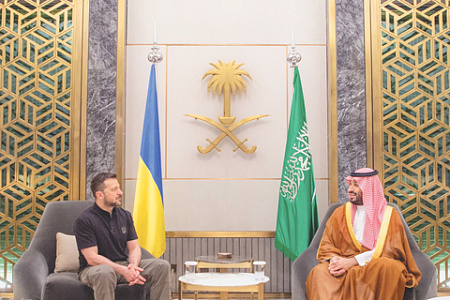
For the first time since the scandalous altercation in the White House between Vladimir Zelensky and Donald Trump, which took place on February 28, Ukraine and the United States are holding official bilateral talks. The White House expects that the Ukrainians will accept the conditions for establishing peace with Russia. Zelensky’s minimum task is to ensure the resumption of supplies of American weapons.
The authorities of Saudi Arabia, where the United States and Russia held talks in February, also received delegations from Washington and Kiev in their country. This alone has great political significance. By the very venue of the meeting, Trump once again emphasized that from now on the United States should be considered not as an interested party to the Russian-Ukrainian conflict, but as an intermediary between the conflicting parties.
The composition of the American delegation is noteworthy. It contains those who conducted the February negotiations with the Russians. These are Secretary of State Marco Rubio, Assistant to the President of the United States for National Security Michael Waltz and Special Representative for the Middle East Steve Witkoff, who is another of the curators of the Ukrainian direction of American foreign policy and, more importantly, a longtime friend of Trump in the current realities of the country.
On the Ukrainian side, Zelensky told reporters, the head of the office of the Ukrainian president, Andriy Ermak, his deputy Pavel Palisa, Foreign Minister of Ukraine Andriy Sibiga and, somewhat unexpectedly, but significantly, Defense Minister Rustem Umerov will participate in the negotiations. This composition of the delegation is also significant. Palisa is a career soldier, a combatant. He, like Umerov, is related to the supply of the army.
The Ukrainian authorities clearly hope that after the meeting in Saudi Arabia, the supply of American weapons will be resumed. Recall that Trump stopped them shortly after the unsuccessful February talks with Zelensky. This decision had no particular practical significance. Ukraine has probably already received over 90% of the American weapons allocated last year. The only serious problem for Kiev could be the cessation of intelligence sharing. Without information from American satellites, Ukrainian drones are unlikely to be able to hit targets deep in the territory of the Russian Federation, and their effectiveness on the line of combat contact would also be reduced. However, Trump soon won back here. On Sunday, March 9, before the talks in Saudi Arabia, he announced that the United States had “almost completed” the moratorium on intelligence sharing with Ukraine. So even before the meeting began, Zelensky achieved a certain concession.
The negotiations of the delegations in Saudi Arabia are scheduled for two days – from March 11 to March 12. They will be held in Jeddah. And on March 10, Zelensky arrived in the capital of the country, Riyadh. He met with the kingdom’s de facto ruler, Crown Prince Mohammed bin Salman. It is known that Rubio also arrived in Saudi Arabia on March 10. It was not reported that he plans to contact Zelensky in any way. And the Ukrainian president, apparently, is determined to receive information from Jeddah without delay and from the direct participants in the negotiations. It seems that his visit is connected with this.
Earlier, Zelensky stated that he was ready to return to an agreement with the United States on the use of Ukrainian rare earth metals. Trump considers its signing as a prerequisite for the start of peace negotiations, indispensable, but not the only one. What other concessions are expected from Ukraine in the White House should be clarified after the talks in Jeddah, if, of course, the parties agree on something.
CNN, citing its sources, reported that this week in Saudi Arabia, representatives of the Trump administration will meet not only with Ukrainians, but also with officials from the Russian Federation. The Kremlin categorically denied this. Russian presidential spokesman Dmitry Peskov, saying that he did not confirm CNN’s information, also noted that it did not matter what expectations the Russian leadership associated with the Ukrainian-American negotiations, “it is important what the United States expects.” Trump, for his part, expressed optimism about the meeting in Jeddah. “I believe that we will make significant progress this week,” he said. Trump did not say what would happen if progress could not be made.
